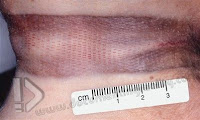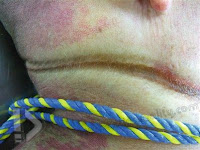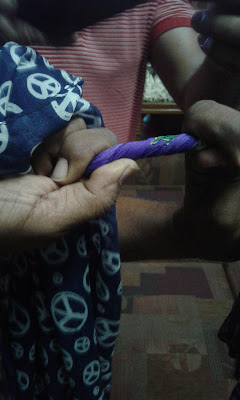Autopsy
Crime Scene
Post Mortem
More News
Ligature marks on Raudha's neck:A case study
<![endif]-->
We here present Raudha's case
that were made to appear likes suicidal hanging due to the presence of a
ligature mark around the neck. On detailed examination and from
circumstantial evidence it was found to be homicidal. A thorough autopsy
examination of the body and meticulous examination of the scene are crucial in
such cases where there is doubt regarding the manner of hanging.
The officilas of
Islamic Bank medical college , Rajshahi ,Bangladesh alledge that Raudha Athif committed suicide by hanging in her room with
the help of a scarf tied to a ceiling fan
on 29.3.2017. On receiving the
information, police investigation team went to the scene of crime and observed that
Raudha was removed from the noose and kept across the bed in her room and the
ligature material was hanging from the celing fan. The
body was send to the mortuary of Rajshahi
Medical College, Rajshahi for the post-mortem examination on 29/03/2017
at 5:00 pm.
Ligature marks are those marks made by
an item of cord, rope, silk or some such material that has been used for the
purposes of strangulation.Ligature
marks come in many different patterns and sizes and can be unique to certain
fabrics and materials and this is why they are so important in criminal investigations
that revolve around the strangling of a deceased individual.Investigations of a hanging case starts with ligature mark and crime scene findings.The ligature marks should match with ligature material.Forensic doctors and Scene of Crime
Officers (SOCO) will normally look for these ligature marks around the neck and
will photograph them at the scene of the crime before the pathologist looks at
them in more depth at the autopsy stage.
Raudha's post-mortem examination conducted on 31/03/2017 at 12:00 pm. The autopsy team states that during the post-mortem examination, ligature mark was observed around the neck and no other external injuries and internal injuries were found except ligature mark.But the ligature mark does not match the ligature material.
Ligature Mark on Raudha's Neck:arrows pointing to impressions caused by a metallic item.Note the visble bruise marks(encircled) of manual stranulation on the photo taken on the 3rd day of the incident by autopsy team doctors
Investigating officers who tried to convine me the case as suicide trying hard to prove the scarf was the ligature material.The scarf was brought in the middle of the night to my hotel by the duos and they by handling the ligature material with bare hand also did DNA contamination of the evidence.The plastic beads cannot produce those two circular impressions because the impressions do not match with the size of the beads and they do not come within the ligature noose.
A soft material like a scarf cannot produce such a deep mark and the width of the ligature mark is continuous around the neck.This also shows that the ligature mark was not by scarf.
This ligature mark was unusual in appearance with multiple marks, which mimic the strangulation by ligature even though autopsy team states it is case of suicidal hanging. This unusual appearance of ligature mark is due to application of a ligature a material which is other than a scarf.The ligature mark is more detectable in cases where the ligature is narrow and material is hard. The suspension time is directly proportional to the detectability of ligature mark.
Ligature
marks come in many different patterns and sizes and can be unique to certain
fabrics and materials and this is why they are so important in criminal investigations
that revolve around the strangling of a deceased individual.
Ligature marks also appear during
what are called manual strangulation; this is when the assailant strangles the
victim with nothing more than his or her bare hands. These ligature marks can
sometimes be in the exact shape of the fingers that have applied the force to
the neck area and it may be possible to extract skin samples for DNA analysis
at this time.
There
have been rare but reported cases where people have tried to stage a homicide as suicide. There are also reported cases where the scene prima facie appeared as
that of homicide but on a closer look turned out to be suicidal. In all such
cases a detailed investigation of the scene, reconstruction of the position of
the suspended body, examination of the ligature material, type of knot, and
direction of the fibers in case of rope helps in establishing manner of
hanging.[1]
To differentiate various types and manner of hanging a meticulous examination
of the neck of the deceased with the internal structures is of immense value.
Such findings assume tremendous importance whenever in doubt regarding the
manner of hanging. In the case presented here, there were multiple turns of
ligature around the neck. The findings aroused the suspicion of homicide but
the examination of scene of crime and other circumstantial evidences were of
crucial importance while deciding the manner of death in this case.
The investigation of the scene, victim and witnesses revealed findings that supported the manner of death as homicide. Also there was no forced entry in the room. The autopsy findings stated by the team were not consistent with suicidal hanging
Reference:
1. Puschel K, Holtz W, Hildebrand E, Naeve W, Brinkmann B. Hanging –suicide or homicide. Arch Kriminol 1984;174:141-53.
2. Nandy A. Principles of Forensic Medicine Including Toxicology, Violent asphyxial deaths, 3rd edition. 2010; p-523.
The investigation of the scene, victim and witnesses revealed findings that supported the manner of death as homicide. Also there was no forced entry in the room. The autopsy findings stated by the team were not consistent with suicidal hanging
Reference:
1. Puschel K, Holtz W, Hildebrand E, Naeve W, Brinkmann B. Hanging –suicide or homicide. Arch Kriminol 1984;174:141-53.
2. Nandy A. Principles of Forensic Medicine Including Toxicology, Violent asphyxial deaths, 3rd edition. 2010; p-523.
Subscribe to:
Posts (Atom)
Featured Post
The mysterious ligature marks on Raudha's neck
We here present Raudha's case that were made to appear likes suicidal hanging due to the presence of a ligature mark around the ne...

Recent Posts
post mortem



















